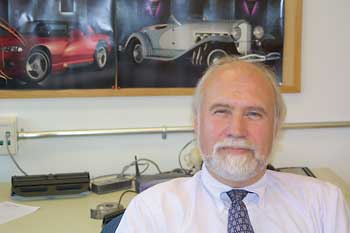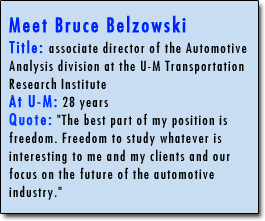In a business marked by fierce competition, where can corporate executives, government officials and independent consultants turn for well-researched, objective and comprehensive information about the auto industry? Most often they go to the U-M Transportation Research Institute (UMTRI).

“(We are) the window on the auto industry,” says Bruce Belzowski, associate director of the Automotive Analysis division at UMTRI. The institute’s clients range from national and international auto manufacturers and suppliers to information technology and consulting firms interested in marketing new auto-centric technologies and services.
Belzowski’s journey into the auto industry had an unlikely start. As a master’s student in English literature and theater, he focused his studies on Charles Dickens and modern theater. “The goal of the theater courses was not to read the text as a piece of literature, but to study how the language is played out on stage,” he says.
While studying at U-M, Belzowski worked as a research assistant at the Institute for Social Research, studying issues surrounding juvenile delinquency. After completing his degree, Belzowski retrained to become a social science researcher.
Belzowski parlayed his research experience into a job with private industry at R.L. Polk, but found that he “liked working at the University better, especially in smaller groups. You have more control over who is making decisions about your career. Supervisors understand your work, so you’re rewarded accordingly.”
Built in the 1960s, UMTRI is a safety research institute funded by state and federal governments, as well as individual manufacturers. “There are only a few safety institutes in the country,” Belzowski says. The institute employs almost 200 people divided into departments that focus on different aspects of auto safety.
The Automotive Analysis division is unique in providing a vision of where the global automotive industry is currently and where it is going, Belzowski says.

Although UMTRI’s clients come from outside the University, the institute benefits from its association with U-M. For example, the biosciences division, which studies the effect of crashes on humans, has strong links to the Medical School, which provides the institute access to a large database of accident statistics.
The institute’s U-M affiliation also has a positive impact on clients. “We are considered honest brokers of knowledge and information. We stick to methodologies that are tested. We do not skew our data,” Belzowski says. “(UMTRI clients) appreciate the integrity of our research.”
In addition to providing consulting and research services to a range of clients, Belzowski also has the opportunity to pursue independent projects via his group’s Affiliates Program, in which companies fund independent research in his division. Many of these projects drum up interest from potential clients and turn into full-fledged projects. Belzowski’s recent work on powertrains, for example, inspired a collaboration with the Environmental Protection Agency and Denzo, a Japanese supplier.
“The best part of my position is freedom,” Belzowski says. “Freedom to study whatever is interesting to me and my clients and our focus on the future of the automotive industry.”

